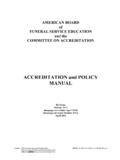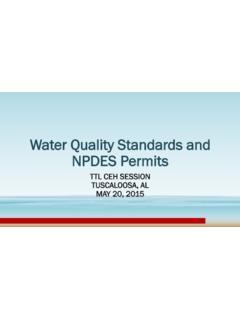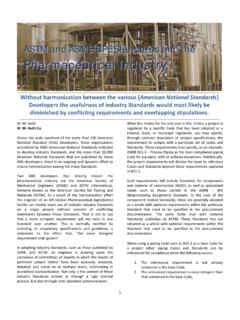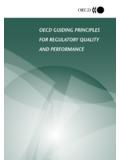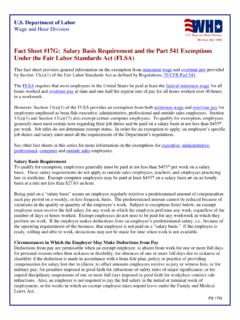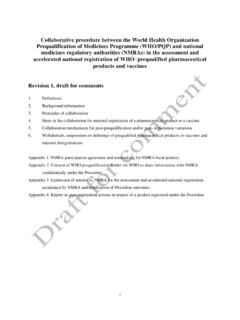Transcription of ABFSE Accreditation Standards
1 ABFSE Accreditation Standards Effective Date: May 1, 2016 (Language update to Accreditation Manual - May 1, 2017, but no change in Standards ) CHAPTER IX Accreditation Standards PREAMBLE Funeral service is a profession practiced by men and women who are required to meet certain educational, societal, and governmental Standards . Some of them are administrative and logistical; others concern health and sanitation. The primary focus of funeral service lies in competent, ethical service to the public. Accreditation of Funeral Service Education programs is intended to help insure that those ingredients necessary to the successful practice of funeral service are offered each student in a consistent and universal manner. Standards have been developed to foster this goal. The Standards of Accreditation , as established at associate (or comparable) degree and bachelor degree levels, are for the most part qualitative and apply to both individual programs and the institution as a whole.
2 In making its decisions on candidacy or Accreditation , the Committee on Accreditation bases its judgment on the objectives of the program, the manner in which it is currently meeting its objectives, and the probability that it will continue to meet its objectives in the future as well as the Accreditation Standards . It is recognized that technology is influencing approaches to providing instructional, academic, and student services to learners, on and off campus. These Standards apply to all instruction and services wherever and whenever and however offered. See also Appendix E of this Manual which contains ABFSE Guidelines for Distance Learning. Standards are expressed in terms of must and shall. Guidelines, intended to help interpret the Standards , are expressed in terms of should and may. The provisions contained in the Standards are separable. If any section, sub-section, paragraph, sentence, clause, phrase, or requirement contained herein shall be held to be illegal or unenforceable, such illegality or unenforceability of such part shall not affect or in any way impair the validity, application, or enforceability of the remaining portion of that section.
3 Each program/institution which offers one or more courses via Distance Learning formats must specifically address that course or courses independent of its discussion of other courses. That discussion must proceed on two levels. First, as each Standard is discussed, specific reference must be made to how the Standard is met by the Distance Learning offering(s). Second, the Self study must demonstrate how each element in the Guidelines is satisfied for each course offered via Distance Learning. See also Appendix E of this Manual which contains ABFSE Guidelines for Distance Learning. The Self study discussion and the Visiting Committee Report relative to Distance Learning offerings will assess to what extent the courses and the educational services offered in support of Distance Learning are structured in a manner that recognizes the distinction between traditional on-campus students and those taking courses via Distance Learning methodologies with regard to admissions, registration, academic advising, tuition and fee payments, bookstore services, library services, testing security, etc.
4 See also Appendix E of this Manual which contains ABFSE Guidelines for Distance Learning. The Self study discussion and the Visiting Committee Report relative to Distance Learning must also assess academic support for faculty ( , faculty training of online course development, access to computer equipment, online support systems, etc.). See also Appendix E of this Manual which contains ABFSE Guidelines for Distance Learning. Accreditation Standards STANDARD 1: SPONSORSHIP STANDARD 2: ORGANIZATION AND ADMINISTRATION STANDARD 3: AIMS AND OBJECTIVES STANDARD 4: ADMINISTRATIVE PRACTICES AND ETHICAL Standards STANDARD 5: FINANCE STANDARD 6: CURRICULUM STANDARD 7: FACULTY STANDARD 8: FACILITIES STANDARD 9: LIBRARY / LEARNING RESOURCES STANDARD 10: STUDENTS STANDARD 11: PROGRAM PLANNING AND EVALUATION / ASSESSMENT STANDARD 12: DEFAULT RATES IN THE STUDENT LOAN PROGRAMS UNDER TITLE IV and COMPLIANCE WITH TITLE IV PROGRAM RESPONSIBILITIES (Only single-purpose, non-regionally accredited, funeral service institutions, which participate in Title IV Higher Education Act programs, must respond) STANDARD 13: RECORD OF STUDENT COMPLAINTS STANDARD 14.
5 PROGRAM LENGTH, TUITION, AND FEES MUST RELATE TO SUBJECT MATTER (Only single-purpose, non-regionally accredited, funeral service institutions, which participate in Title IV Higher Education Act programs, must respond) STANDARD 15: PROGRAM LENGTH IN CREDIT HOURS (Only single-purpose, non-regionally accredited, funeral service institutions, which participate in Title IV Higher Education Act programs, must respond) STANDARD 1: SPONSORSHIP Accreditation is granted to programs within either single-purpose or multi-purpose sponsoring institutions. The program/institution must provide evidence that it assumes responsibility for curriculum content, classroom teaching and clinical education, appointment and evaluation of faculty, policies and procedures for admission, and awarding a diploma, certificate, or degree documenting completion of the program. The program must provide evidence that clinical experiences assigned each student are educational in nature.
6 The sponsoring institution must provide, or arrange for the provision of, all portions of the required curriculum including all classroom, laboratory, clinical field experiences, and services necessary to support the curriculum in funeral service education as specified in the Standards . The sponsoring institution must demonstrate evidence of sound financial support of the educational program on a current and continuing basis. The sponsoring institution must provide written evidence that it is approved by the appropriate governing authority in which it is located, or within which it offers instruction, to award the diploma, certificate, or degree for which it seeks Accreditation . In situations in which there are conflicts between an Accreditation Standard and a governmental or institutional requirement, the more stringent rule will be applied. In a program in which more than one institution or organization provides academic and clinical education, the sponsoring institution must provide evidence or properly executed written agreements describing the responsibilities of the respective institution or organizations.
7 If a funeral service program is associated with, or financially sponsored by, an organization whose main purpose is other than education, the sponsoring institution must provide written evidence of sufficient separation between the host institution and the funeral service program to guarantee an effective, independent, and objective learning environment. See also Standard STANDARD 2: ORGANIZATION AND ADMINISTRATION The governing board must be the legally constituted group which holds the assets of the institution in trust. It must be responsible for sustaining the institution, approving its objectives, and implementing and controlling the program. The authority and responsibility of each organizational component of the sponsoring institution (governing board, campus and program administration, faculty, students) together with the processes by which they function or interrelate, must be clearly described by means of a current constitution, by-laws, or some similar means.
8 The administration of the institution and/or program must provide educational leadership competent to establish conditions providing for good learning opportunities for students, good working conditions for faculty, and good communication processes both inside and outside of the institution/program; provide management of resources in support of educational objectives; define expectations and quality control requirements of all agencies providing off-campus instruction in the name of the institution; and establish an expeditious process allowing for communication flow both downward and upward within the organization in order for the administration to assess the achievements of its goals and the needs of its constituents; A single purpose institution offering only a program of funeral service education must be administered by a chief administrative officer, directly accountable only to the governing board for the management of the institution. All other employees must report directly, or indirectly, to this chief administrative officer.
9 This officer may also be a member of the teaching faculty, as long as the teaching load is reduced commensurate with administrative duties. A funeral service program within a multi-purpose institution must be administered by a director who has been delegated responsibility for the program. All other employees assigned to the program must report directly or indirectly, to this person. This officer may also be a member of the teaching faculty, as long as the teaching load is reduced commensurate with administrative duties. The program administrator for a program in a multi-purpose institution or the institutional chief administrative officer for a single purpose institution must possess an academic background consistent with the position of leadership held. For those hired after May 1979, this will always involve at least the master s degree, within five years of the date of the initial full-time appointment in funeral service education, from a regionally accredited college or university.
10 For program administrators earning degrees in colleges or universities outside the United States, the institution awarding the degree must have fulfilled governmental Standards which in the judgment of AACRO are acceptable or similar to those of the ABFSE . Within program policies, provisions must be made for consideration of student views and judgments in those matters in which students have direct and reasonable interest. In order to provide additional guidance to non-regionally accredited institutions for which the ABFSE acts as gate-keeper and to clarify the documents that representatives of the Committee on Accreditation (COA) conducting Accreditation -related visits (both regularly scheduled and unannounced) are expected to review, the COA hereby advises all involved of the following expectations: The institution is expected to provide or have available on campus for review a complete list of members of the Board of Trustees as well as a list of members of the Advisory Committee.
